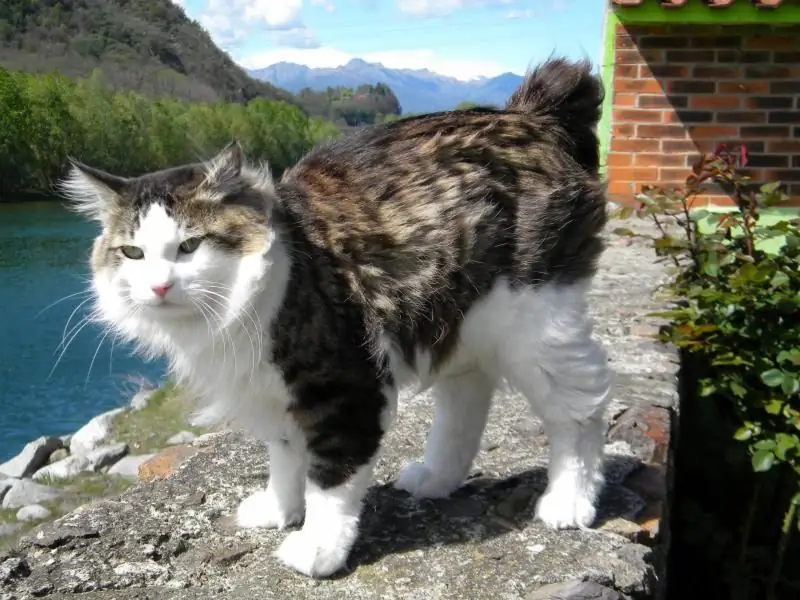
Table of contents:
- Author Bailey Albertson albertson@usefultipsdiy.com.
- Public 2024-01-17 22:26.
- Last modified 2025-01-23 12:41.
American bobtail: national pride with a short tail

American breeders take pride in breeding many exotic species of domestic cats. One of such bright and worthy breeds in all respects - the American Bobtail - due to circumstances, still remains rare and little-known. I would very much like the situation to change in favor of these wonderful animals - they deserve it in full measure.
Content
-
1 History of the origin of the breed
1.1 Video: all about the American Bobtail breed
-
2 Features of the American Bobtail
-
2.1 External data
2.1.1 Photo Gallery: American Bobtail Color Palette
-
2.2 Character and behavior
2.2.1 Video: American Bobtail Playing
- 2.3 Propensity to disease
- 2.4 Disqualifying faults
-
- 3 How to choose a kitten
-
4 How to care for an American Bobtail
- 4.1 Hygiene
-
4.2 Feeding
4.2.1 Video: American Bobtail Walking
- 4.3 Toilet
-
5 Breeding American Bobtail
5.1 Castration and sterilization
- 6 Reviews of the owners about the breed
History of the origin of the breed
In the sixties of the last century, a young married couple of American Sanders went on a trip to the state of Arizona on the Indian reservation. They returned home to Florida with an unusual trophy - a grown-up kitten, which they picked up right on the street. It was a tabby cat with a short tail and tassels on its ears. One of the Indians said that, probably, such a baby could have been born from an ordinary domestic cat and a wild lynx.

The American Bobtail kitten really looks like a little lynx
Subsequently, both outbred and high-breed individuals participated in the formation of the American Bobtail:
- ragdolls;
- snow show;
- manx;
- Himalayans;
- Burmese;
- siamese.
Among the close friends of the Sanders were, fortunately, professional breeders Charlotte Bentley and Mindy Schultz, who actively helped novice felinologists in the formation and consolidation of the breed characteristics of the American Bobtail.

Breed selection began with short-haired individuals, and point colors were separated into a separate branch
At first, selection was made only on the basis of short-haired individuals. But as the blood of long-haired breeds increased, bobtails with semi-long fur appeared - this option immediately became very popular, since such a coat looks very impressive. The breed still remains open - it is allowed to cross its representatives with other domestic cats for the sake of healing and expanding the gene pool, which is still small today.

American bobtail with long hair looks very elegant
The breed standard of the American Bobtail was developed in 1970, and the breed received its first official recognition from the TICA association in 1989. In felinological slang, this breed is often called the Yankee Bob. By 2000, such reputable organizations as ACFA, UFO and CFA recognized the new breed of American Bobtail cat.
Video: all about the American Bobtail breed
Features of the American Bobtail
The Yankee Bob is the pride of American felinology and even a national treasure of the United States, but it remains one of the rarest breeds of domestic cats. At the beginning of this century, there were no more than two and a half hundred of these animals in the world.
External data
American Bobtails are rather large and athletic animals, they have a heavy, well-knit body, very powerful legs and a short thick tail. Cats on average can weigh about eight kilograms, while cats can weigh about six.

Yankee Bob - an athlete in a fluffy fur coat
The head is rather large, wedge-shaped, the muzzle is wide, "chipped", almost square. The ears set high, of medium size, are rounded at the top and topped with beautiful lynx-like tassels. Almond-shaped, slightly slanted eyes set wide apart; their color can be any, but be sure to be in harmony with the color.

American bobtail eyes are very expressive
The breed has a dense, well-developed undercoat and can be either short or semi-long. The standard allows all known color variations. The fur on the neck, chest and hind legs should be longer than on the body.
But special emphasis is, of course, on the tail. But, unlike other bobtails, the tail of the Yankee bob retains the mobility of all vertebrae. It looks like a hairy tassel, set high and triumphantly lifted up when the cat is in a good mood. If the tail is down, then it should not go down below the "skipping ropes" of the bobtail.

Cute short ponytail American bobtail looks like a shaving brush
Photo gallery: American bobtail color palette
-

American bobtail tabby - "Wild" colors are considered basic for the breed
-

American Bobtail Shorthair bicolor - There are a lot of options for bicolor colors
-

American bobtail gray - Short coat accentuates athletic build
-

American Bobtail marble - Marbled color options are preferred for the American Bobtail
-

American bobtail color-point - Yankee Bob inherited point variations from Siamese cats
-

American bobtail white - Long-haired white "Americans" are the height of elegance
-

American bobtail black - Black cat with a short tail - mystical exotic
-

American bobtail van - The color "van" means that only the tail and part of the head are painted over
-

American bobtail peach - Delicate shades of peach in color are graceful and very popular
-

American bobtail tricolor - Tricolor kitty will bring good luck to its owner
Character and behavior
Despite their heroic appearance, American bobtails in no way show fighting qualities and aggressiveness. They are calm, agreeable and balanced - they have just a wonderful character, which makes representatives of this breed almost problem-free pets for home keeping.

The character of this breed is simply wonderful
Remember that the high intelligence of your pet is constantly demanding new information for reflection and only toys to satisfy this thirst for knowledge will not work. The American Bobtail needs regular walks with its owner to replenish the experience and maintain good physical shape. He quickly learns to walk on a harness and walks on a leash obediently, like a trained dog.

Yankee Bob doesn't mind walking on his own, but it's better to walk him on a leash.
The only thing that furry athletes categorically cannot stand is loneliness. They are ready to make friends not only with cats, dogs, but also with almost any pets - just to have constant companions for games and communication.
But the best friend of the American bobtail has always been and remains a man. This cat is ready to follow its beloved owner everywhere: in the house, on a walk and even on a long journey. They say that truckers are happy to take their pets on trips - can any other breed of cats boast of this?

American bobtail willingly travels in a car with the owner
Video: American Bobtail plays
Disease propensity
Usually, American bobtails do not give their owners problems and concerns about their health. These cats are naturally endowed with a strong immune system and are not prone to genetic pathologies. Their average life span is fourteen to fifteen years. But it is not uncommon for Yankee beans to live for more than two decades - it depends not only on good heredity, but also largely on competent maintenance at home.

Good physical shape is the key to health and longevity
Overweight can be a big problem for the American Bobtail. Some owners, in pursuit of the external effect, feed their pets just to the point of indecency. As a result, instead of an athletic build, clear signs of obesity appear and, as a result, diabetes, problems with the heart and the musculoskeletal system: Yankee beans, like all heavy cats, have a predisposition to articular pathologies - primarily to hip dysplasia. Such an ailment can be caused by both genetics and improper cultivation.
The American Bobtail has also been noted to have a tendency to diseases of the excretory system, urolithiasis, as well as allergic reactions, excessive dryness and irritability of the skin are observed along some lines.
Disqualifying vices
An expert at an exhibition, evaluating an animal, will first of all pay attention to its tail and hips. The American Bobtail will be definitely disqualified if his hips are weak, and the tail is completely absent, or, conversely, has the usual length for other cat breeds. The normal tail length is from two to seven centimeters. Kinks of any quantity and quality under strict refereeing will also lead to "disqualification" and a ban on participation in breeding.

Too short a tail is a disqualifying fault.
You should not count on a high rating even if your pet's head does not meet the breed standard:
- the transition from the forehead to the nose is not smooth, but very sharp;
- the muzzle is elongated or short;
- the size of the head is not in harmony with the dimensions of the body.
How to choose a kitten
Buying a small American bobtail is not so easy at all. A rare young breed, unfortunately, is growing very slowly in numbers. To get a thoroughbred kitten, you need to register in advance and wait a long time - sometimes more than a year. The cost of these short-tailed beauties also remains high - for a pet-class kitten it starts at five hundred dollars, and a promising show animal can be estimated three to five times more expensive. Add here the cost of delivery from overseas - the amount as a result will be very significant. But she does not stop true connoisseurs of the breed.
And here the question arises: what signs can indicate that you are acquiring a high-breed animal? Oddly enough, first you need to pay attention not to the ponytail, but to the head of the baby who is offered to you for sale. The kitten's muzzle should be almost square, with a prominent forehead and large tubs.
Already at an early age, it is easy to see the proportions of the body, which are very important for a show specimen - it is desirable that the body is compact and rectangular, with a strong topline, and the skeleton is wide, massive and solid.
Well, and of course, the tail - how can it be without it - make sure that there are no accrete vertebrae and creases on it. Check that the length matches the standard: it is not too short, but also does not exceed the distance to the knee of the hind leg.
How to care for an American Bobtail
There are no special secrets for caring for an American Bobtail. These cats descended from outbred animals, so they are very simple in keeping, and unpretentious in nutrition. However, in this case, there are certain rules that should be strictly adhered to if you care about the health, longevity and good physical shape of your pet.
Hygiene
Brushing is a must for the American Bobtail - both longhaired and shorthaired. It must be done at least two or three times a week. And for the duration of the seasonal molting, it will be useful to comb the cat a couple of times a day - unless, of course, you want all surfaces in the house to be covered with a coating of weightless dying down. This breed has a lot of undercoat and sheds very actively, therefore, in the arsenal of a home groomer, in addition to the usual slicker, there should also be a good furminator.

Furminator helps to comb the undercoat well
It is important, as for all other cats, to keep the eyes, ears and teeth of the Yankee Bob clean - this will prevent the development of inflammatory processes and serious diseases. It is enough to wipe the inner surface of the ears and the corners of the eyes once a week with a cotton sponge soaked in warm boiled water. You can also use special lotions - a large assortment of them is offered at pet stores and veterinary pharmacies.
When examining the oral cavity, you need to pay attention to whether dental plaque is formed and whether your pet's gums are inflamed. Plaque must be removed in a timely manner so that tartar does not appear - funds for this are also sold in stores and on the Internet. And gum inflammation should be the reason for contacting a veterinarian in order to exclude the possibility of periodontitis in time.

Ears need to be cleaned regularly - but not deeply
As for the claws, in American Bobtails they grow rather slowly and grind off by themselves if you regularly go for walks with your pet. Otherwise, the claws should be carefully trimmed as they grow back.
Feeding
Overeating or too high-calorie food can provoke obesity for the Yankee Bob, especially if the animal is deprived of sufficient physical activity. Choosing the right natural diet for the American Bobtail is not easy - you need to take into account both the general qualities of the breed and the individual characteristics of the pet. Therefore, breeders recommend feeding representatives of this breed with ready-made professional super premium food.

It is important to choose the one that best suits your pet from the variety of foods.
Up to one year of age, actively growing cats should receive small portions of food at least four times a day. An adult animal should be transferred to three or even two meals a day. It is especially important to monitor the diet of sterilized individuals - they easily gain excess weight.
Video: American Bobtail for a walk
Restroom
A large and active Yankee bob will not fit a cramped, shallow tray - heaps of garbage will constantly form around it. A spacious closed-type cat litter box would be much more appropriate.

A closed tray house is most suitable for an American bobtail
The type of filler does not really matter - use the one that your pet was used to as a child, while he lived with a breeder. The only thing worth considering: for long-haired "Americans" substandard mineral and especially wood fillers are categorically not suitable. When soaked and turning into a sticky slurry, the granules will stick to the fur on the legs and tail - thus, dirt and an unpleasant odor will spread throughout your apartment.
Breeding American Bobtail
Non-professionals should not breed American Bobtails. And not at all because this topic is, as it were, the property of a closed club for the elite. The breed is still too young and unstable; in order to maintain and improve it, it is necessary to adhere strictly to a single strategy in breeding work. Moreover, to expand the gene pool, fresh blood is still dosed in the breed - mating with other domestic cats is allowed.

Only a professional can make the correct breeding pair
Like all large, heavy cats, American Bobtails mature rather late and become sexually mature. It is highly undesirable to allow an animal that is not fully formed in breeding - this can cause irreparable harm to its physical and psychological state, as well as negatively affect the health of the offspring. The first mating for representatives of this breed can occur not earlier than two years of age, and for especially large individuals even later - by three years.
Yankee beans rarely have problems in the reproductive sphere: cats easily tolerate pregnancy and childbirth, take excellent care of the offspring. Representatives of this breed are so tolerant that they willingly undertake to raise not only their own, but also other people's children. Interestingly, a happy father often helps his girlfriend in taking care of the younger generation - this phenomenon is extremely rare in other breeds of cats.

Three kittens is already a large litter for an American Bobtail
Castration and sterilization
The peculiarities of breeding work with American Bobtails lead to the fact that breeders in most cases offer kittens for sale with the obligatory condition of subsequent sterilization. This operation should not be done too early - you need to wait until the animal is fully formed. The optimal age for such a surgical intervention is one and a half to two years.

The operation must be preceded by a detailed health check of the animal
Reviews of the owners about the breed
In the cheerful "family" of short-tailed domestic cats, the American Bobtail remains to this day, perhaps, the rarest and most exotic breed. However, the Yankee bob is generally different from his fellow bobsters - not only by an excellent character, but also by a mobile tail without wrinkles. And this is largely responsible for the health of the offspring and, hopefully, for the great prospects of this young, but very interesting breed.
Recommended:
Russian Blue Cat: Description Of The Breed, Photos, Features Of Care And Maintenance, Breeding Cats, Choosing A Kitten, Owner Reviews
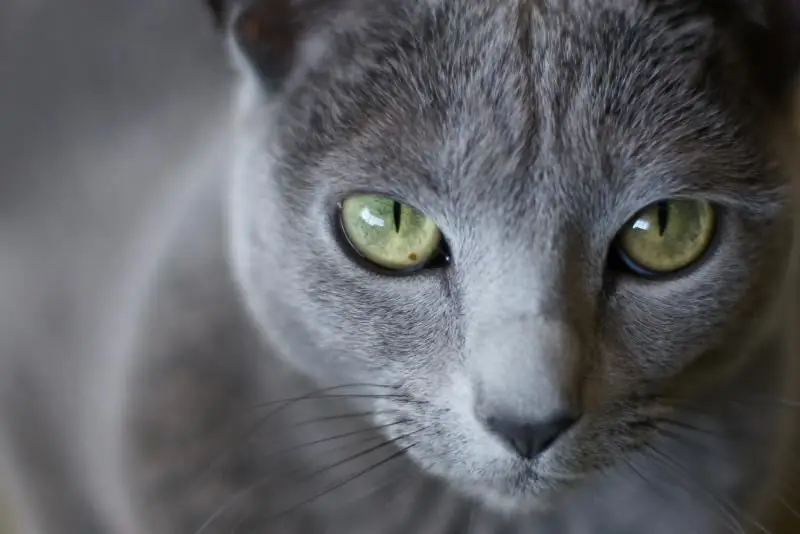
Everything you need to know about the Russian blue cat: the history of the formation of the breed, characteristics, behavioral features, rules for the care and breeding of animals
Oriental Cat: Breed Description, Maintenance And Care, Photos, Kitten Selection, Oriental Breeding, Owner Reviews
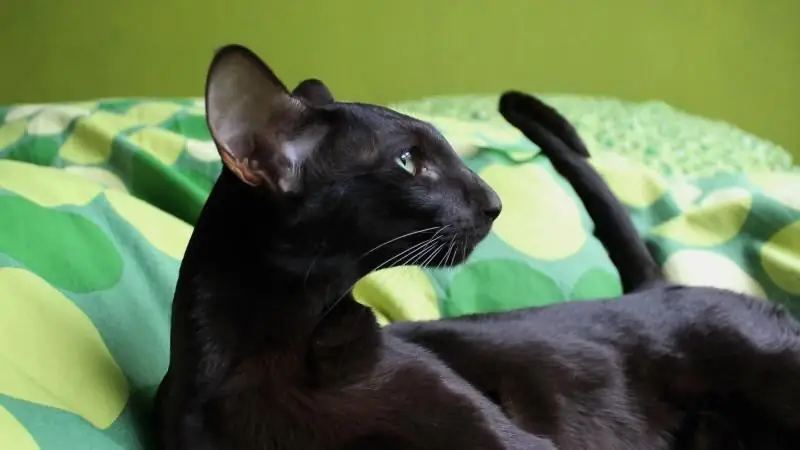
What is the difference between oriental cats and other breeds. Breed standards and temperament. Features of the care, maintenance and feeding of orientals. Choosing a kitten. Breeding
American Curl: External Features Of The Breed, Care And Maintenance, Character Of The Cat, Choice Of A Kitten, Owner Reviews, Photos
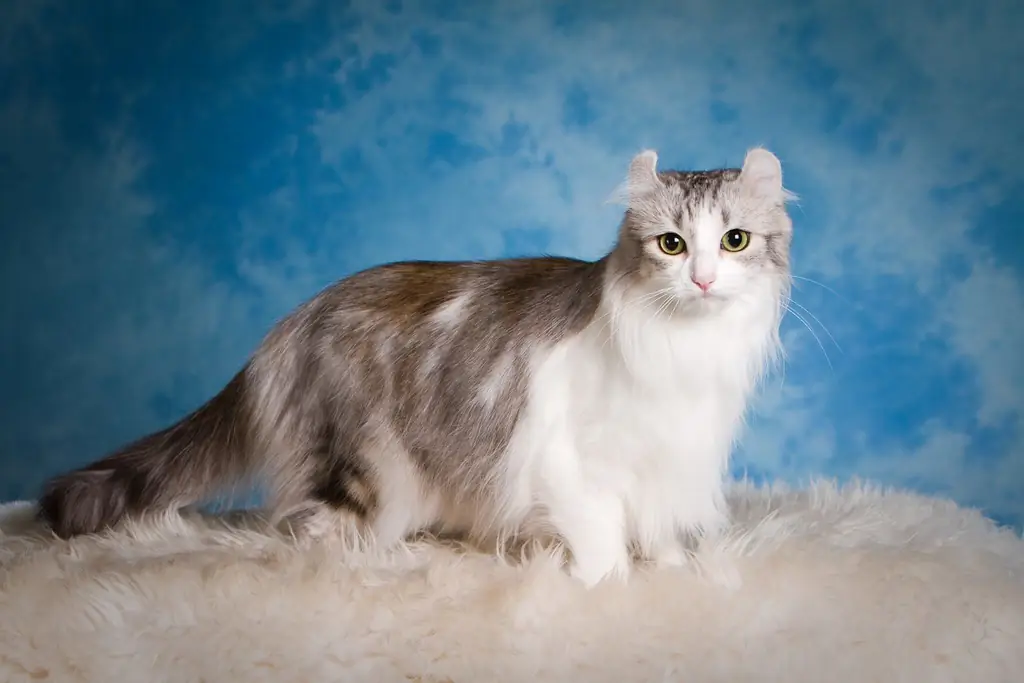
Where the American Curl breed was bred. The main external differences, character traits. Rules of care and feeding. Tribal work. Owner reviews
Anatolian Cat: Features Of The Breed's Appearance, Care And Maintenance Of The Cat, Character And Habits, Breeding Pets, Owner Reviews
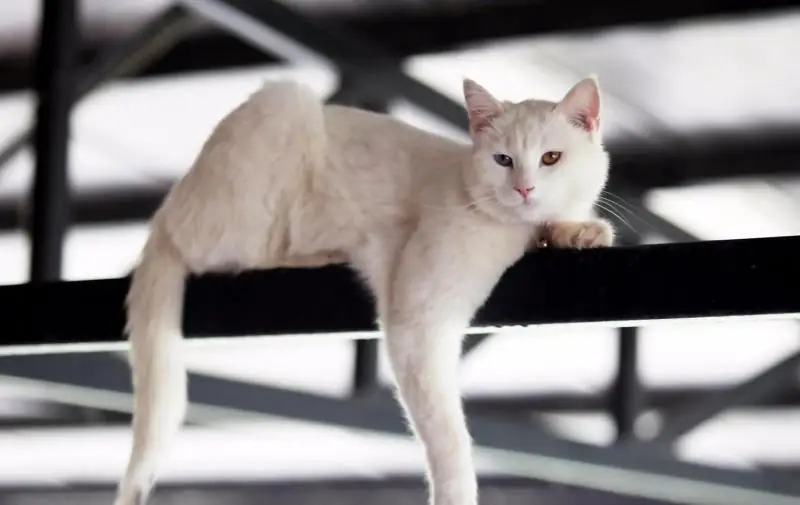
Where the Anatolian breed is bred. The main external differences, the nature of the pet. How to properly care for him, feed him. How to choose a kitten. Breeding. Reviews
Selkirk Rex: Breed Description, Care And Maintenance, Photos, Breeding Cats, Choosing A Kitten, Owner Reviews
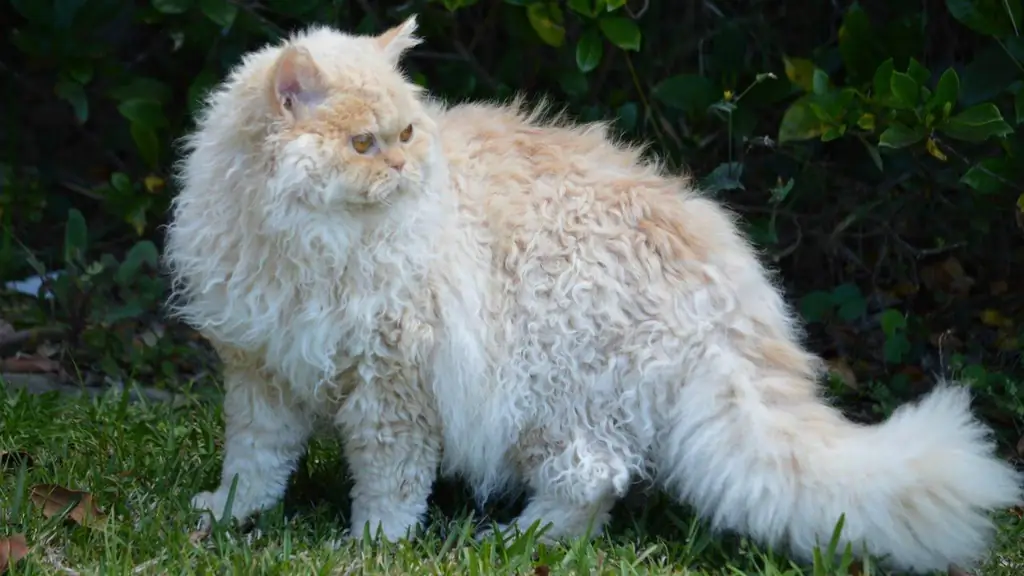
Where the Selkirk Rex breed was bred, its external differences and character. How to properly care for these cats, feed and treat them. How to choose a kitten. Reviews
